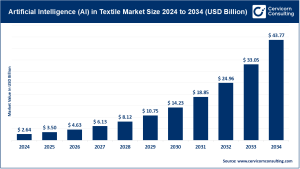Market Overview
The global AI in data management market was valued at USD 30.84 billion in 2025 and is projected to reach approximately USD 238.31 billion by 2035, registering a CAGR of 22.69% during the forecast period.
AI in data management encompasses the application of artificial intelligence technologies—such as machine learning (ML), natural language processing (NLP), and context-aware computing—across the entire data lifecycle. These advanced systems streamline and enhance processes like data ingestion, cleansing, integration, cataloging, and governance. With the surge in both structured and unstructured data from digital platforms and connected devices, businesses are increasingly adopting AI-driven data management platforms to unlock real-time insights, optimize performance, and improve data quality.
Get a Free Sample: https://www.cervicornconsulting.com/sample/2807
Key Market Trends
1. Rise of Cloud-First and Hybrid Data Management Models
Businesses are rapidly migrating from legacy on-premises infrastructure to cloud-native and hybrid AI data management environments. Cloud-based platforms provide scalability, cost-effectiveness, and agility—facilitating seamless real-time data processing and analytics. This shift is propelled by enterprise digitalization initiatives and the need for remote, distributed data accessibility.
2. Integration of Generative and Context-Aware AI
Generative AI and contextual ML models are redefining data management by automating critical but repetitive tasks such as data tagging, labeling, transformation, and anomaly detection. These technologies empower autonomous, self-optimizing systems capable of managing complex data pipelines while dynamically adapting to business needs.
3. Emphasis on Governance, Privacy, and Compliance
As global data regulations grow more stringent, enterprises are incorporating AI-driven governance and compliance mechanisms into their data infrastructure. Automation in policy enforcement, lineage tracking, and auditing ensures adherence to frameworks like GDPR and CCPA—particularly vital in industries such as banking, healthcare, and government services.
4. Expansion of Multi-Modal and Real-Time Data
The explosion of IoT, 5G, and connected ecosystems has increased demand for platforms capable of managing multi-modal data—including images, audio, video, and sensor information. AI-enabled solutions facilitate rapid ingestion and analysis of streaming data, providing actionable insights for sectors like manufacturing, telecommunications, and smart infrastructure.
5. Convergence of Data Fabric and Lakehouse Architectures
Enterprises are increasingly adopting data fabric and lakehouse models that merge structured and unstructured data environments. These architectures simplify data access and integration while enabling real-time analytics and AI model deployment. Vendors offering end-to-end, secure, and ML-integrated data ecosystems are emerging as market leaders.
Market Drivers
1. Unprecedented Growth in Global Data Volumes
The digital economy’s expansion—driven by IoT devices, automation, and social platforms—has created an overwhelming surge in data generation. Conventional systems can no longer handle this complexity, leading organizations to deploy AI-powered automation to process, contextualize, and manage data at scale and speed.
2. Demand for Automation and Instant Insights
Companies are prioritizing the automation of repetitive data tasks to enhance accuracy and reduce operational latency. AI-enabled systems deliver real-time analytics, minimize manual workloads, and support agile decision-making in fast-moving industries such as e-commerce, BFSI, and telecom.
3. Cloud Expansion and Scalable Infrastructure
The growing reliance on cloud technology is accelerating AI adoption in data management. Cloud-native AI solutions enable enterprises to expand compute and storage resources on demand, supporting scalability and ensuring consistent data performance across distributed networks.
4. Regulatory Compliance and Data Protection
Global data privacy regulations—including GDPR, HIPAA, and CCPA—have compelled organizations to invest in AI-based compliance solutions. These tools automatically detect anomalies, manage access control, and ensure secure data processing, helping companies mitigate regulatory and reputational risks.
5. Rising Industry-Specific Data Requirements
Sectors such as healthcare, banking, and telecommunications generate immense, sensitive data flows that require intelligent, automated management systems. AI in data management enables predictive healthcare analytics, fraud detection, and network optimization, driving sector-specific innovation and performance.
Impact of Trends and Drivers
-
Deployment Models: The dominance of cloud-native and hybrid setups reflects enterprises’ focus on flexibility, performance, and data interoperability.
-
Data Applications: The management of non-text data types—such as multimedia and IoT data streams—is becoming a major growth area.
-
Regional Dynamics:
-
North America leads the market, fueled by strong AI ecosystems and early cloud adoption.
-
Asia-Pacific records the fastest expansion, supported by government-led AI initiatives and digital transformation programs.
-
Europe continues to advance under strict governance frameworks and sustainability-driven digital policies.
-
-
End-User Industries: Telecom, BFSI, and healthcare remain at the forefront of adoption, utilizing AI tools for automation, compliance, and intelligent analytics.
-
Product Offerings: Comprehensive platforms integrating data integration, quality management, governance, and analytics are gaining traction as enterprises pursue unified, AI-augmented ecosystems.
Challenges and Opportunities
Challenges
-
Fragmented legacy infrastructures and inconsistent data quality.
-
Limited availability of skilled professionals in AI-based data management.
-
Data localization, sovereignty, and compliance complexities across regions.
-
Risk of dependency on proprietary ecosystems and vendors.
Opportunities
-
Growth of no-code and self-service AI platforms democratizing access to advanced analytics.
-
Increasing adoption across new domains such as smart manufacturing, logistics, and renewable energy.
-
Integration of generative AI for metadata automation and dynamic data discovery.
-
Rapid expansion in developing markets undergoing digital and cloud transformation.
Future Outlook
The AI in data management market is on a transformative trajectory, projected to rise from USD 30.84 billion in 2025 to about USD 238.31 billion by 2035, expanding at a CAGR of 22.69%.
Future developments will center around generative AI, autonomous governance systems, and real-time edge data processing. Vendors offering scalable, hybrid, and secure data management platforms—enhanced with intelligent automation and predictive analytics—are expected to lead the competitive landscape.
As enterprises increasingly recognize data as a strategic asset, AI-enabled data management will serve as a cornerstone for innovation, operational excellence, and sustainable growth across global industries.
To Get Detailed Overview, Contact Us: https://www.cervicornconsulting.com/contact-us
